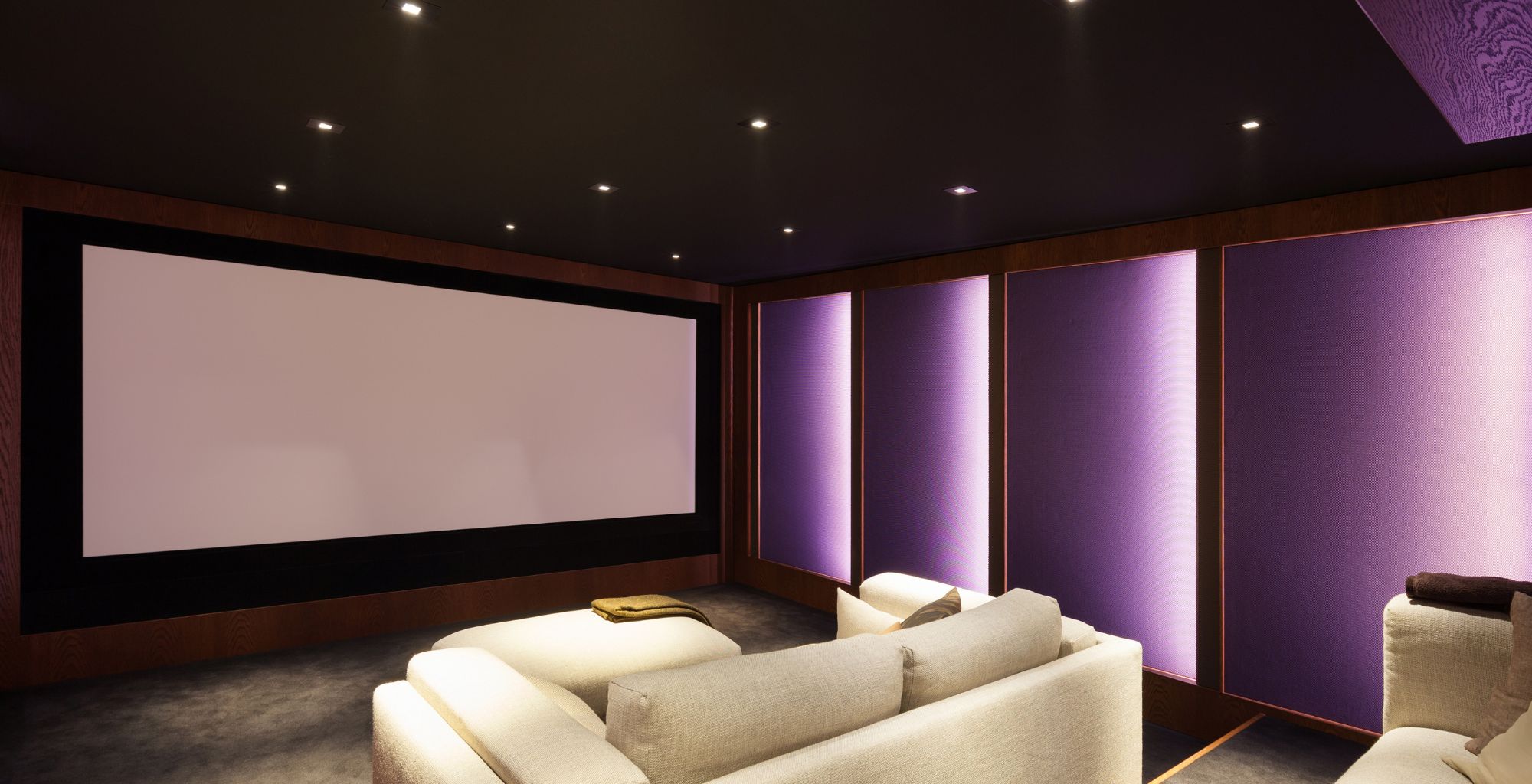Are you considering a move to the North West and want to know where the best places to live...

Home cinemas | A guide for home buyers
The rise of streaming and the decline of traditional cinemas has led to an increase in people installing home cinemas for their own homes.
Whether you’re considering a property with an existing setup or are planning to install one yourself to give your home that big-movie feel, you can get in on the act. But you’ll need to decide what’s the right system for you.
That’s the purpose of this guide, which helps you turn your movie nights into a cinematic experience all from the comfort of your own home.
What equipment do home cinemas need?
Selecting the right equipment is absolutely pivotal when setting up a home cinema. From high-definition screens to state-of-the-art sound systems, your choices define the viewing experience.
Here’s what you need to consider regarding home cinema equipment.
Projectors vs TVs
When it comes to the heart of your home cinema, the big decision is between a projector or TV. Sure, a TV delivers crisp picture quality, but a projector takes you to another level with that larger-than-life screen.
If you’re leaning towards a projector, don’t just pick any. Think resolution, brightness and contrast ratio. A 4K projector will dazzle you with its visuals, and a high brightness rating keeps the image sharp, even in a room that’s not pitch-black.
Choose the right speakers
The right speakers change the whole dynamic and provide an authentic cinema vibe. For many, Dolby Atmos is the go-to for surround sound, adding height channels to your usual 5.1 or 7.1 setup for an even more immersive feel. But don’t just grab the first set you see – factor in the room size and power output of your amp or receiver to make sure you’re hitting all the right notes when the movie starts.
Select the right receiver
The AV receiver or amplifier is the heartbeat of your home cinema. This is where the magic happens, as it powers your speakers and processes those all-important video signals. When you’re on the hunt for a receiver, think channels, power output and the ins and outs you’ll need.
If you’re using a Blu-ray player, you’ll want to go 4K for high-quality video playback.
Designing the cinema room
The look and feel of the room are just as important, with aesthetics playing a major role. You want it to compliment the rest of the home and add to the style.
Here are some factors to consider when designing the cinema room.
Seating arrangements
Don’t underestimate the power of seating, as it’s key to your cinema room’s overall vibe. You want seats positioned for prime viewing, aiming for a 30 to 40-degree angle to the screen for the best effect. And speaking of screens, size matters. The bigger the screen, the more distance you’ll want between it and your seats. It’s all about getting those proportions just right for a top-tier movie-watching experience.
Lighting considerations
Lighting is more than about detail and plays a central role in the cinema room’s atmosphere. Think mood lighting that dims when it’s showtime. Keep those light levels low because no one wants glare messing with their screen. Also, be strategic about where you place lights with the aim of dodging any screen reflections. The right lighting sets the stage for the ultimate viewing experience.
Acoustic considerations
Acoustics contribute to your listening experience while also protecting the sound from travelling to other rooms. First off, soundproofing is a must to keep out any external noise. Go for high-level insulation to make sure the sound stays where it should.
When it comes to room shape, rectangular is your best bet to avoid any sound distortion. There’s also the speaker placement to consider. You’ll want a left-to-right speaker approximately 45-60 degrees apart from your main listening position, while the subwoofer is often best placed in the corner room.

What should I consider for the installation process?
If you’re looking to install a cinema room rather than move into a house with one in place already, you’ll need to think about how to build it. Here are the main factors you should take into consideration.
DIY vs professional installation
You’ve got two routes when it comes to installation: DIY or go pro. DIY might seem budget-friendly, but don’t underestimate the complexity and risks. A pro, especially one with CEDIA certification, will help with a seamless, safe setup. They know the ins and outs, from design to calibration and can even advise on integrating it into your smart home ecosystem.
Insulation and soundproofing of home cinemas
Insulation keeps the room’s temperature steady, and traps sound, while soundproofing blocks out the world – both are important for home cinemas. Think plasterboard and Green Glue for top-notch soundproofing. And don’t DIY the electricals – get an electrician in. A pro installer will team up with them to make sure your setup provides the best output and is, most importantly, safe.
Home cinemas’ intended use can dictate requirements
Utilising a home cinema serves two primary functions: cinematic viewing and gaming experiences. Here are the distinct requirements for each to maximise your system’s capabilities.
For movies
Experiencing films via a home cinema system elevates the viewing pleasure.
A top-tier projector coupled with an immersive surround sound setup can replicate a theatre-like atmosphere within your residence.
For optimal visual quality, proper projector setup is crucial. This entails correct distance measurement from the screen and precise focusing. Additionally, maintaining a dust-free screen is essential.
Sound quality is equally vital. Accurate speaker placement and calibration are key to achieving superior audio output. Should you find this challenging, consult the user manual or engage a professional for guidance.
For gaming
Utilising a home cinema for gaming significantly enhances the experience.
Whether you’re on a gaming console or an Apple TV, the expansive screen and enveloping sound amplify the enjoyment.
For console gamers, proper connectivity to the home cinema system is essential. To achieve the finest visual output, configure your console for Full HD resolution.
On the audio front, contemporary games often support surround sound. Ensure your speaker setup capitalises on this feature. For an even more immersive auditory experience, you might consider investing in a quality gaming headset.
Choosing the right location for home cinemas
Selecting the optimal location is vital in the creation of a home cinema. You’re generally faced with two choices: repurposing an existing space or constructing a new room altogether.
Converting existing spaces into home cinemas
Repurposing an existing area is often the go-to for those constrained by budget or space. Typical candidates are basements, garages, or unused rooms. Key considerations should include the room’s dimensions, shape, and ease of access. Acoustic properties and the potential for effective soundproofing should also be on your radar.
Building a new room
Constructing a new space is the premium choice for those desiring a room solely for their home cinema. It affords greater latitude in design and layout, optimising the viewing experience. As you plan, ponder the room’s dimensions, shape, and positioning within the home. Acoustic qualities and the feasibility of effective soundproofing should also be carefully evaluated.
Houses with home cinemas
Many luxury houses come with home cinemas already installed and ready for use, but it is often the case that a buyer will need to consider where it would go. Or there might be a dated home cinema in a house that requires updating.
Collaborating with a professional is imperative for the meticulous design and installation of a home cinema room. Not only will it elevate your viewing experience, but it also safeguards your investment and provides you with a high-quality setup in your home.
If you’re searching for a luxury home with enhanced facilities and amenities our team of expert property finders would be delighted to assist. To discuss your property search please do get in touch, without obligation.







